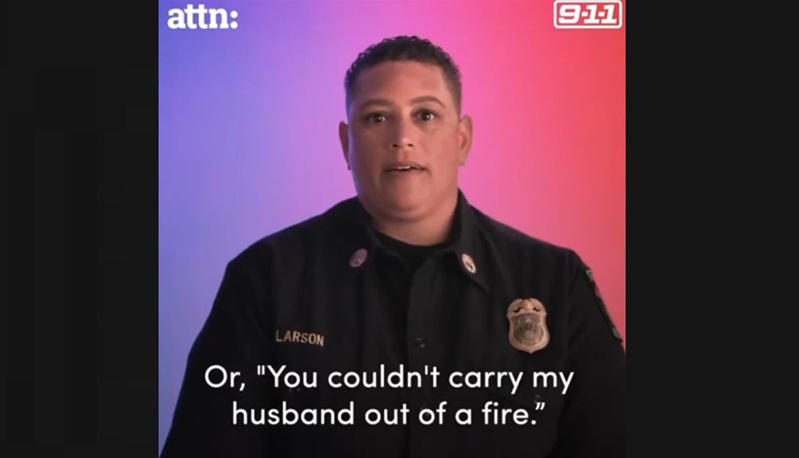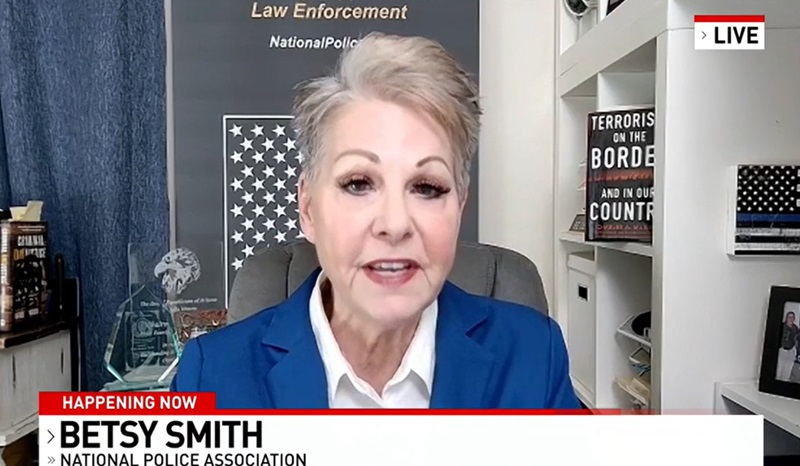
It is not often a brand-new police academy comes into existence, but the concept grants law enforcement agencies more control of police-related instruction, in-house experienced trainers, operational preparedness, and home-based management of criminal justice doctrines instituted by state standards overseeing the regulatory feats of future public safety professionals.
One of the unique benefits of any law enforcement organization owning and operating a police academy is the advantage of access to funds provided via the tax base to autonomously garner recruits and compensate them throughout the rigorous months of intense training. Given today’s difficulties in police recruitment, incentivizing the challenge is a no-brainer.
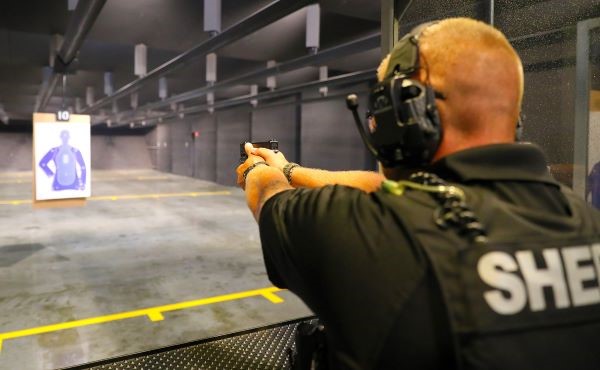
(Photo courtesy of the Miami Police Department’s Chief Clarence Dickson Police College.)
From the Miami, Florida, police department, a bulletin from its Training Academy section read as follows: “Applicants who applied for the Position of Police Officer in December [2023] have begun Orientation. Our Recruitment and Selection has been working around the clock to move them along and help them through the process.”
Conversely, the genre of police academies ordinarily operated by community colleges under the banner of a Public Safety Institute as for-profit entities is available to just about anyone who can pass a basic background screening and enroll as a student…bearing the tuition expense, aka “self-sponsored.”
Some of these community college programs do offer educational credits that qualify toward an Associate degree conferred by that college entity, not necessarily transferrable to any other college or university, effectively relegating credit-hour achievers to continue their education (other than studying to be a cop) right there.
Like others in Florida, my county of residence has a Public Safety Institute operated by the local community college bearing the county’s name. With rare exceptions (police agency sponsorship), all law enforcement program aspirants bear the entire tuition responsibility.
Albeit many moons ago, I was among 31 other students (self-represented recruits, some of whom took out school loans to attend…with no guarantee they’d secure a role as a police officer) at the police academy. The tuition back then was around $3,000. or so.
For the sake of discussion and as a disclaimer, I was already employed by a police department as a civilian in uniform assigned as a community service officer aka police aide, thus my tuition was paid by the agency (“sponsorship” equates to a reserved seat and tuition tab fulfilled), at which I would subsequently serve as a sworn officer.
That circles back to a bona fide law enforcement academy that does everything in-house and ardently recruits, processes, and trains those that agency figureheads believe are the finest for their jurisdictional scope.
In other words, applicants submit requisite reams of paperwork, wait, get called for further scrutiny, wait some more, are invited to advance to “the next steps,” and, once deemed optimally suited for the police role, are granted a “conditional offer” to attend their academy with a salary throughout (all equipment included). This is akin to state-level police academies, many of which require residing in the barracks during training weeks, with furloughs granted on weekends.
The state has a say in the matter…
In Florida, the Lee County Sheriff’s Office recently posted that they were “granted a ‘Type A’ Training Certificate from the Criminal Justice Standards and Training Commission under the Florida Department of Law Enforcement.”
Essentially, the Lee County SO is now licensed to operate a police academy under the auspices of the state Criminal Justice Standards and Training Commission (CJSTC) whose regulatory principles associate with the Florida Department of Law Enforcement (FDLE), especially the high liability aspects such as firearms training.

(Photo courtesy of the Lee County Sheriff’s Office.)
As one may imagine, the manifestation of a new police academy does not happen overnight. Ample time and careful planning factor into aggregating all the components, situating all the pieces, and acutely composing the application for approval as a bona fide law enforcement training facility meeting myriad specifications legislated by state criminal justice figureheads.
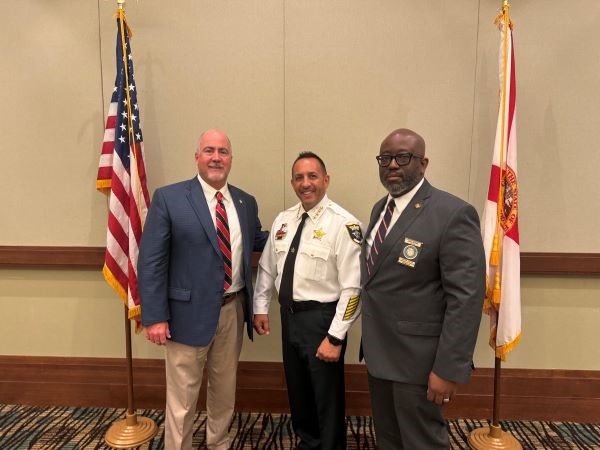
(Photo courtesy of the Lee County Sheriff’s Office.)
Hence, Lee County sheriff’s executives, deputies, county commissioners, and citizens have ample reasons to be proud.
Besides what I delineated in our opening paragraph, other virtues evolved from the academy ownership concept.
“This certification will enable LCSO to operate its own Criminal Justice Academy to give newly hired cadets the required training to become certified Law Enforcement and Corrections deputies.
“Having our own training center and dedicated personnel is vital to accommodate the growing needs for law enforcement and corrections personnel in Lee County. Academy classes can be conducted as needed to get boots on the ground more quickly.”
That last part…
Given today’s climate of relying on external sources (largely self-pay police academies) to meet muster in a timely fashion based on understaffed police agencies’ immediate needs, no LCSO executive needs to confer with the local community college administrators regarding timetables set forth to meet agency-specific dilemmas such as sworn-strength vacancies.
In my experience, while receiving my law enforcement training, bureaucratic fires ignited here and there.
Nevertheless, the community- or technical college-held police academy will have its place in the future-cop ecosystem: smaller law enforcement departments (comprising the majority among America’s 18,000-plus police organizations) remain on the receiving end of recruits after graduating as a “certifiable” LEO.
When police academy graduates are sworn in by a law enforcement agency, they are officially certified as bona fide cops —the proverbial rite of passage— after the state examination to be a police officer is administered by the respective CJSTC staff (proctored by a fusion of sworn cops from various agencies in the area.)
Academies teach cadets what they need to know, making successful test-takers eligible for careers as cops.

(Photo courtesy of the Bureau of Indian Affairs, Office of Justice Services.)
Basic Law Enforcement Training (BLET) academies provide the fundamental (basic) instruction to effectuate meeting the standards set forth by the state’s CJSTC.
While every cadet in training at the local police academy is rated in their academic achievements and physical agility, sufficiently meeting the minimum standards set by the state, law enforcement entities operating their own training academy have the luxury of promptly forging agency needs daily (versus a generally instructed cadet hoping for a LE job once the program is completed, no guarantees of a job).
Respectfully, outsourced pools of potential BLET cadets attend community college programs as students and are therefore subject to the academic institution’s rules and regulations, right up to the stipulated credit hours, whereby LE agency-owned and operated academy recruits’ training can go beyond the “basic” threshold as deemed befitting (providing the extras, e.g. martial-arts training, are embraced and endorsed by the CJSTC as enhancements in defensive tactics).
For example, the Lee County Sheriff’s Office training academy “curriculum under the CJSTC entails 770 hours of training for law enforcement officers and 420 hours for corrections personnel, to include general and high liability subject matter.”
I used the martial arts example above since I know of no state’s CJSTC or POST (Police Officer Standards and Training) that requires such a highly specialized skillset in its police curriculum. This, too, is slowly evolving in law enforcement organizations’ training disciplines.
“With this, the Lee County Sheriff’s Office will still work closely with the Southwest Florida Public Service Academy to ensure the great residents of Southwest Florida have the best-trained law enforcement and corrections personnel in the country,” explained a LCSO bulletin.
Although sworn cops’ in-service training (additional/ongoing police education) is ordinarily obtained at community colleges’ public safety institutes, with both sworn and non-sworn instructors considered experts in a respective discipline (arson investigations) putting on a course and granting certificates of completion to attendees from various agencies in the region (or beyond), in-house academies operated by a law enforcement entity conduct extra training by their experienced LEOs/civilian personnel, scheduled accordingly, not having to cut checks to the community college and keep up with its registrar.
Back in the day when I was a police recruit attending the local community college’s BLET program, there were no police-owned and -operated academies in the county, meaning every police department or sheriff’s office waited on the pool of cadets to graduate and apply. (That has since changed, with the two largest law enforcement agencies in the county manifesting their own training academy.)
Similarly, most in-service courses were rolled out at the community college, with a rare few structured by one of the LE organizations and convened at their headquarters or other venue in their jurisdiction.
Between community colleges and law enforcement agency police academies, both have their place (hence, Lee County SO echoing ongoing relations). It takes a large sovereign government with a robust tax base to afford its own training facility and the experienced staff to instruct cadets who are compensated throughout months of intense police training.
Ultimately, the many modest-sized law enforcement entities (U.S. majority) that cannot necessarily afford in-house training, let alone their own academy, defer to the community college and its graduates from which to choose applicants for processing. There’s a place for everything and just about everyone.
My county sheriff’s office also launched its own law enforcement training academy, recently boasting its latest graduated deputies as the largest class in its brief history.

(Photo courtesy of the Hillsborough County Sheriff’s Office.)
Respectfully, being salaried while being equipped for such a complex, demanding profession is a handsome value, especially nowadays, with the economic pressures upon us. It is likely that community college-operated police academies have some unoccupied seats. A dual equilibrium remains, though (in-service courses in LE).
Alluded to above, the Hillsborough County Sheriff’s Office (HCSO) in-house law enforcement training academy does instruct cadets in martial arts, a bonus beyond the fundamental defensive tactics instruction taught at/by all police academies in America. (Been brewing information regarding jiu-jitsu in law enforcement and the unique skills and disciplines that it instills to keep cops sharp, safe, battle-ready, alive.)
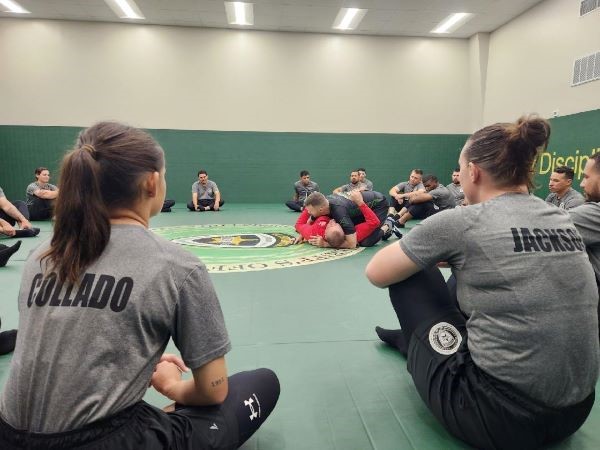
(Photo courtesy of the Hillsborough County Sheriff’s Office.)
Incidentally, academies offered by community colleges are instructed by well-experienced cops (both active and retired) who are privately hired by academic administrators overseeing a director (usually retired LEO) and teach according to CJSTC standards—another way for LEOs to help put food on their table thanks to secondary income. Again, equilibrium.
Circling back to the Lee County Sheriff’s Office launching their brand-new law enforcement academy, recruiters have already harvested a full complement to attend their first “Criminal Justice Academy classes” that are “set to begin on June 24th [2024]!”



